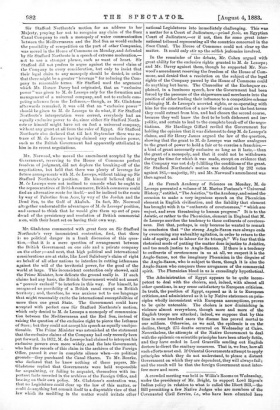In the remainder of the debate, Mr. Cohen argued with
great ability for the exclusive rights granted to M. de Lesseps; and Mr. Davey against them, though he supported Mr. Nor- wood's amendment reserving the freedom of the House of Com- mons, and denied that a resolution on the subject of the legal rights of the Company passed by the House of Commons could do anything bat harm. The Chancellor of the Exchequer ex- plained, in a luminous speech, how the Government had been forced by the pressure of the shipowners and merchants into the position of either lending their influence to a competitive scheme infringing M. de Lesseps's asserted rights, or co-operating with him for the construction of a new line of canal on the best terms they could extract from him, and had chosen the second course, because they well knew the first to be both dishonest and im- politic, and certain to lead to the complete break-off of the nego- tiations. Sir Hardinge Giffard reviled the Government for holding the opinion that it was dishonest to deny M. de Lesseps's claims, and Sir Henry James argued the law of the question, showing that the grant to M. de Lesseps was rather analogous to the grant of power to hold a fair or to exercise a franchise,— a kind of grant necessarily exclusive so long as it lasts,—than the grant of a monopoly, and that it could not be withdrawn during the time for which it was made, except on evidence that the Company was not duly fulfilling the conditions of the grant. Sir Stafford Northcote's motion was defeated by 282 votes against 183,—majority, 99; and Mr. Norwood's amendment was then agreed to.


































 Previous page
Previous page